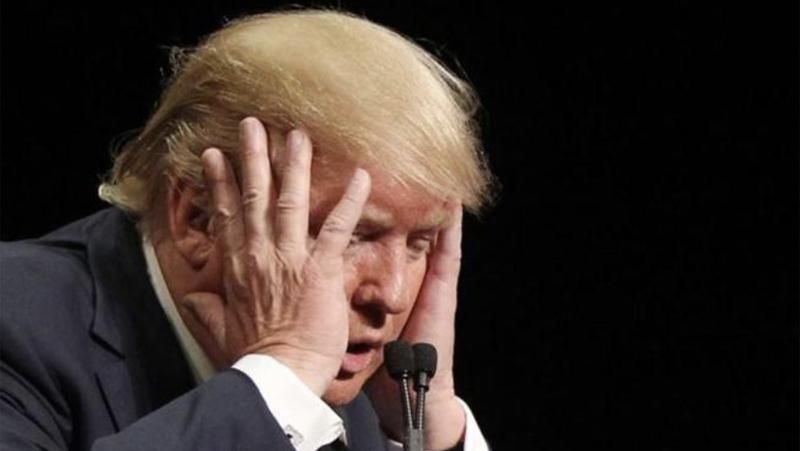One of Donald Trump's excuses for his attempt to overthrow the 2020 election has been to blame his lawyers. That's not going to work, said one former Justice Department official.
Speaking to former Robert Mueller senior prosecutor Andrew Weissmann and MSNBC host Ari Melber for a Trump indictment special on Sunday, was former Principal Deputy Assistant Attorney General for National Security Mary McCord. She goes line-by-line with each of the defenses cited by Trump or his lawyers and explains why none of them are going to hold up in court.
Introducing the segment, Melber compared it to "The George Costanza Defense," after the Seinfeld character who claimed, "Jerry, just remember, it's not a lie if you believe it." As Melber explained, that doesn't necessarily work unless you can claim the insanity defense. That might not help a campaign for the U.S. presidency.
POLL: Should Trump be allowed to run for office?
"All criminal charges---almost all---require there to be some knowledge or intent on the part of the defendant. The criminal law really eschews the idea of strict liability---liability for conduct you don't know is illegal," McCord explained. "But that's very different than saying he had a firm belief that the election was stolen as some sort of get-out-of-jail-free card. There are lots of things in this indictment that he engaged in, conduct that he engaged in, that went well beyond what you are legally allowed to do when you firmly believe you did not lose the election."
Melber used another example, that if someone truly believes that a bank is evil, it doesn't entitle them to then rob the bank.
"It might be a not-guilty-by-reason-of-insanity defense, but it would not negate the intent for what you have done," McCord said. "You don't have the right to go take it just because you think the bank is evil. It could even have a more simple example. Let's say you think the bank miscalculated the interest on your savings account. And so it's not even at the bank is, evil it's just wrong. And you've asked them for it, and they disagreed with you, but you firmly believe your math is right, and their math is wrong. You just don't get to go hold up the bank. That's exactly what we're talking about here."
What the indictment walked through, she continued, is that Trump could not have reasonably believed that there was enough fraud to change the outcome of the 2020 election.
"But even if he did," she speculated, "that doesn't mean you can orchestrate a scheme of fake electors, send their ballots to the vice president to have then be counted. It doesn't mean that you can put really unlawful pressure on state officials, including either threatening criminal prosecution, as he did with respect to Secretary of State Brad Raffensperger."
Weissmann said it's perhaps the worst defense he's ever heard because "no jury will go down that road with him."
Another defense of Trump's is that he was "just joking" about his attempts to overthrow the government or that he wasn't really going to do something like that. While Trump might claim that it didn't actually happen, McCord disagrees.
"It pretty much did come to fruition," she said. "This notion of a conspiracy is — oftentimes when people say we weren't really going to do it. So, it doesn't work here. It doesn't work factually, and it's something the laws that the law has had to deal with in many of the situations."
The next Trump defense is that his First Amendment rights are being violated and his attacks on the 2020 election were protected speech.
"This is something that Jack Smith dealt with right at the beginning of the indictment, and he makes clear Mr. Trump has the right First Amendment right to speak. He even has the First Amendment right to lie about what he thinks about the election results show. But what he doesn't have the right to do is conduct that is based on a fraud. And fraud always involves some type of expression. That's the very heart of fraud. You have engaged in conduct, here a conspiracy, multiple conspiracies based on a fraud, based on lies. So, there is a distinction between speech, which he is entitled to do, and conduct, which is something clear in the indictment, for the talking points for Trump and his supporters, it makes for a quick clip and makes like what the judge is done is unlawful."
Finally, another excuse Trump gives is that his lawyers told him that the 2020 election was fraudulent, and he believed those lawyers.
"When your co-conspirator is a lawyer, you don't get to rely on the co-conspirators' voice as a defense," McCord laughed. "Here we know from the unindicted co-conspirators who have been identified that most of those, in fact, all but possibly one, were acting as lawyers. That's the 'thing one,' and 'thing two' is you can't just go cherry-pick around when all of your lawyers are telling you there's no significant fraud and this fraudulent elector scheme won't work. You can't just keep trying out new lawyers, hunting lawyers until you find one to agree with you."
Weissmann explained that the perfect dispute for Trump's claim that he trusted his lawyers is Mar-a-Lago. In that case, his lawyers advised him on what to do with the FBI, and he consistently ignored them. In fact, The Nation's legal analyst, Elie Mystal, argued this week that Trump is currently ignoring any legitimate legal defenses.
See the conversation in the clip below or at the link here.
Leave a Comment
Related Post
